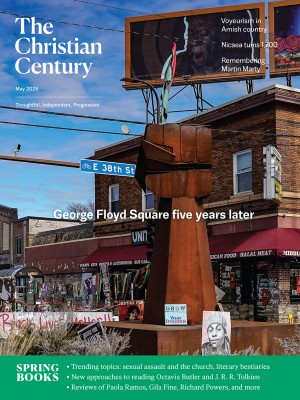May 11, Easter 4C (Psalm 23; John 10:22-30)
Jesus is very clear: Snatchers, no snatching!
Do you remember those pictures in church hallways and Sunday school rooms, the ones with the fluffy, white, gentle sheep surrounding Jesus? This is the image I’ve always associated with Psalm 23 and its assurances of God’s tender, joyful, shepherdly care. The psalm and the image alike paint a bucolic scene of pleasingly rocky ground, with patches of green pastures and clear running streams. The sunlight is golden and soft. Serene birds fly around the horizon. A freshly laundered Jesus stands in the center of the scene with a kind look on his face.
The psalm adds a sumptuous holiday dinner, with crystalline sparkles all around, as a kind of second act to the scene. Of course, the psalm also adds the whole valley of the shadow of death thing and the enemies who lurk around the edges. But these seem like the vignette filter on the soothing word images of the psalm. Whether we connect the shepherd in the psalm with Jesus or not depends on our orientation as Bible readers. It’s not hard to imagine, though, that the shepherd in the psalm looks a lot like Jesus in the image: casually leaning on what looks like a hook-topped walking stick, maybe even cradling a lamb in his other arm. All the other sheep are politely spaced out. Everyone is clean and fluffy, ready for eternal life.
Read our latest issue or browse back issues.
That is, until someone harpazō-s them. Harpazo is the Greek word that John uses in verses 28 and 29 to describe the action of “snatching” the sheep from the Father’s hand. It’s a nasty word in Greek. Usually associated with violent possession of a person or a thing, sometimes connected with sexual violence and war. It’s not at all a word that one wants to confront in the course of a clean, fluffy, bucolic kind of life.
This week’s reading from John comes at the end of the “Good Shepherd” discourse where Jesus uses an extended metaphor of a shepherd protecting his sheep from thieves and bandits to describe his relationship with his followers and those who have rejected him. John’s Jesus, in using this metaphor, discloses that he senses an acute threat to his followers. Earlier in the chapter he warns of thieves and bandits and strangers who seek to kill and destroy the sheep. Then in this week’s verses, Jesus ratchets up the anxiety of would-be snatchers when he uses the verb harpazō twice: once to juxtapose such snatching with eternal life, and once to describe the Father’s gift to Jesus. Jesus is very clear. Snatchers, no snatching!
But our images of how Jesus wards off this snatching threat are not equally clear. Anyone who has seen actual sheep knows that they rarely (if ever) look like they just came out of the stuffy aisle at the toy store. Sheep wander around unfarmed pastureland. They kick up the muck of a rain-soaked pen. They live amid the brambles and brush of a rocky landscape. They are muddy and smelly. They have sticks and gunk in their wool. They have slobbery noses and backsides that have not been properly tended. They attract all manner of annoying insects and parasites. And they are not at all worried about sharing these repulsions with each other—or the humans among them, including their shepherds.
Shepherds are equally unbucolic. They are right in the muck-and-bramble mix, yelling commands to the sheep, pushing and shoving them in the right direction. And that walking stick? Yeah, that’s a crook—it’s for hooking a wayward sheep. I am quite sure the sheep do not like being pulled from their path with a hook around their bellies. I know from experience that sheep do not sound melodious in the throes of being rerouted.
Now in the fourth week of Easter, I feel the resistance to being rerouted rising in me. I love that Easter morning feeling—fresh spring breezes, budding flowers, fluffy baby critters, smart-looking families, melodious hymns. But in 2025, the reality of my life, even as I live firmly in Easter’s promises, looks a lot like the reality of Jesus’ life among those in the temple in John 10. I try to show and tell everyone I meet that Jesus is the Messiah and the shepherd of God’s unfailing love. I try to live with mercy as my rule and justice my goal. I try to show the world the fluffy-and-clean, ready-for-eternal-life me.
The reality looks much more like a dirty sheep pen. So why would I want a freshly laundered, dewey-faced shepherd? After all, the muck and bramble of crucifixion and death are not wiped clean by resurrection.
Jesus, the shepherd, comes into our muck-and-bramble world and wards off would-be snatchers. Our reading from John 10 takes place before crucifixion’s gore and resurrection’s scars, but Jesus reminds readers that the work he does in God’s name proves his position in our lives. God’s unfailing love, mercy, and justice do not come only for the fluffy-and-clean sheep living along the sparkling stream—Jesus shows us with his life and his resurrection that we need a new image for the shepherd metaphor. I, for one, am grateful that our muck-and-bramble shepherd does not expect something different from us as sheep.






